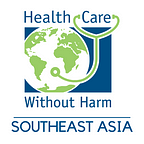Stronger Healthcare Voice needed to tackle the Climate Crisis and Environmental Injustice in Southeast Asia
A few weeks into the new year amidst a growing pandemic, tens of thousands of Indonesians have been displaced by a chain of massive flooding in several provinces in Indonesia.
According to a report from the International Federation of Red Cross (IFRC), there was excessive rainfall that caused rivers to overflow inundating at least 10 sub-districts in the provinces of Aceh, East and West Java, North and South Kalimantan, West Nusa Tenggara and West Sumatra.
In the city of Mamuju in West Sulawesi on the other hand, a 6.2 magnitude earthquake killed at least 84 and left thousands of people homeless. In a news report, doctors in the area continued to do their best in a makeshift medical tent outside the only hospital in the city that survived. Severe infrastructure damages were reported across Mamuju including 2 major hospitals and 3 community health centers that collapsed.
DISASTERS AND ENVIRONMENTAL DEGRADATION ADD STRESS ON HEALTHCARE
Environmentalists have attributed the recent heavy floods in south of Indonesia to widespread deforestation for palm oil plantations and coal mines.
As an illustration, greenhouse gases (that can be found in burning of fossil fuels) cause global temperatures to increase rapidly and intensify hurricanes and typhoons. Despite this known fact and the clear public health risks and costs of dirty air, as of January 2020, Indonesia has a total of 32,373 MW of operating coal plants and 11,840 MW-capacity in construction.
South Kalimantan in particular, has 13 coal companies as of 2013 according to the provincial government data.
In addition, dr. Raynaldy BP of RISE Southeast Asia Alliance for Health and Climate (Indonesia), said that a big part of Bogor, West Java’s highlands were transformed into housing and recreational sites. When asked about the connections that gave way to these disasters, he shared that, “understanding the chain of disaster has never been so important as today since things don’t happen instantly. The floods and landslides were the result of active deforestation and housing projects.”
dr. Puspita Sampekala, Chief of Green Hospital organization of RSUD Cibinong in West Java which is a Global Green and Healthy Hospital member shared that, “the government already has guidelines and a mitigation plan on natural disasters but adequate collaboration with local and center governments are needed, especially in this time of a pandemic.” If we look at the urgency for a climate-resilient healthcare, she added that, definitely local hospitals need endorsement to re-build and reinforce their systems in order to continue serving the public especially in this time of a climate crisis and a global public health emergency.
Indonesia’s neighbor the Philippines is also experiencing a similar pattern of exacerbated climate-induced disasters and environmental degradation in which very recently was battered by super typhoons amidst COVID-19. Typhoon Goni pounded the south of the Philippines’ main island of Luzon and damaged 67 health facilities in the Bicol region and CALABARZON, while Typhoon Vamco displaced hundreds of households and killed dozens of people in the city of Marikina with its powerful winds and torrential rains.
To emphasize, in this period of a global pandemic converged with the preexisting climate crisis, disasters and disease outbreaks are known to harm people’s health and disrupt lives. This puts to challenge the healthcare system in Indonesia, the Philippines and the rest of Southeast Asia that is fundamentally unprepared for disaster response and climate-induced pandemics.
ROLE OF HEALTHCARE PRACTITIONERS IN ADVANCING CLIMATE SOLUTIONS AND ENVIRONMENTAL PROTECTION
People are anxious about climate change; apprehensive about the future and alarmed by what we are doing to our planet and ecosystems. In order to develop these feelings of concern into concrete actions, raising their awareness through education, formation and mobilization is urgent and important. This is where health practitioners can help.
Doctors, nurses, caregivers, nutritionists, and health workers have one of the most trusted voice in society.
It is also important to note that climate change is also a public health issue. They are therefore in an influential position to transform policies and can be an effective spokesperson for campaigns and programs aiming to protect the health of the people and the planet.
Dr. Ronald Law of RISE Southeast Asia Alliance (Philippines) and Preparedness Division Chief of the Philippine Department of Health — Health Emergency Management Bureau explains that, “the role of the health practitioner is to use his/her profession to advocate for concrete and urgent actions on climate change adaptation and mitigation and health sector resilience to policymakers in light of Covid-19 and concurrent emergencies that have affected the Philippines, Indonesia and other countries.”
“To be concrete, a campaign advocating for a healthy and equitable recovery from COVID-19 and climate change with health professionals at the front line is a must.” Dr. Law added.
Considering the role of a healthcare provider in issues that impact the environment and our climate, dr. Raynaldy added that, “it is true that living in a disaster-prone area requires a health care disaster plan, quick response team and a mitigation system in place. But it is also important that we think about the carbon footprint of our health facilities that could aggravate our climate. As an example, hospitals can reduce their energy consumption and lower down medical waste to the minimum number.”
